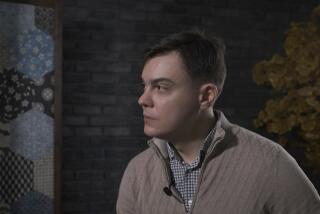KGB Defector Told U.S. of ‘Spy Dust’ Use
- Share via
WASHINGTON — A high-ranking KGB defector’s disclosure that the Soviets were making repeated use of potentially hazardous “spy dust” to track the movement of U.S. diplomats in Moscow led to the State Department’s unusual accusation against the Soviets last month, government sources said Friday.
The warning by Vitaly Yurchenko, who defected Aug. 1 while on a temporary assignment in Italy, came atop earlier indications that the Soviets were using the chemical sporadically and persuaded U.S. officials to go public with the accusation.
The sources said key information obtained from Yurchenko by the CIA and FBI, which are questioning him at an undisclosed site in the United States, ranks him as a “much more important” defector than Oleg A. Gordievski, the head of the KGB’s London operation who defected to the British earlier this month.
Yurchenko--whose name was spelled Dzhurtchenko in initial reports of his defection--served as first secretary of the Soviet Embassy in Washington from August, 1975, until late 1980, giving him access to crucial details of KGB operations in the United States. The assignment also helps explain why government sources have attached such significance to his defection.
“More will be unraveling in months to come, and that’s why this is so sensitive,” one source said.
Yurchenko has told U.S. interrogators that Soviet intelligence has “never” penetrated the State Department, according to government sources, who declined to be identified by name or agency.
The sources said CIA officials were disturbed that Yurchenko’s defection became public as quickly as it did, saying that he had wanted his action kept quiet because his family remains in the Soviet Union.
In accusing the Soviets of using the chemical nitrophenylpentadienal, or NPPD, to track the movement of Americans in Moscow, the State Department said it had determined that the chemical is a mutagen, or capable of altering cells, and thus a potential cause of cancer, though its precise effects were not known.
Reason for Going Public
The government sources said Yurchenko had alerted the United States that Soviet security police were using increasing amounts of NPPD and that this led to the decision to make a public accusation. The charge was made Aug. 21 in Moscow and Washington.
Afterward, a team of U.S. medical investigators traveled to Moscow to study the Soviets’ alleged use of the chemical dust and assess its potential for harm. In addition to gathering samples, the study includes an effort to determine whether NPPD can actually be absorbed through the skin, and thus pose a danger to health.
The team hopes to have developed solid information about the chemical by next month.
Meanwhile, the Justice Department and the CIA denied a New York Times report that Yurchenko had identified several CIA employees as Soviet agents.
“Yurchenko has not indicated that there are any employees of the CIA working as Soviet agents,” the Justice Department said in an unusual break from its practice of making no comment on such reports.
In addition, a government source informed on intelligence matters denied an Associated Press report that quoted an unidentified congressional source as saying that Yurchenko had implicated several former employees of the intelligence agency.
More to Read
Sign up for Essential California
The most important California stories and recommendations in your inbox every morning.
You may occasionally receive promotional content from the Los Angeles Times.












